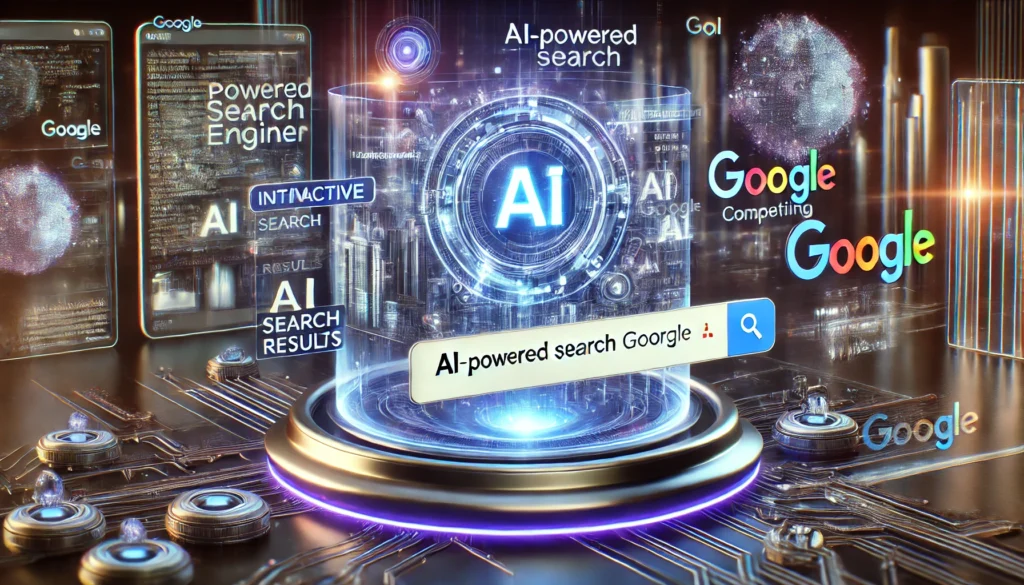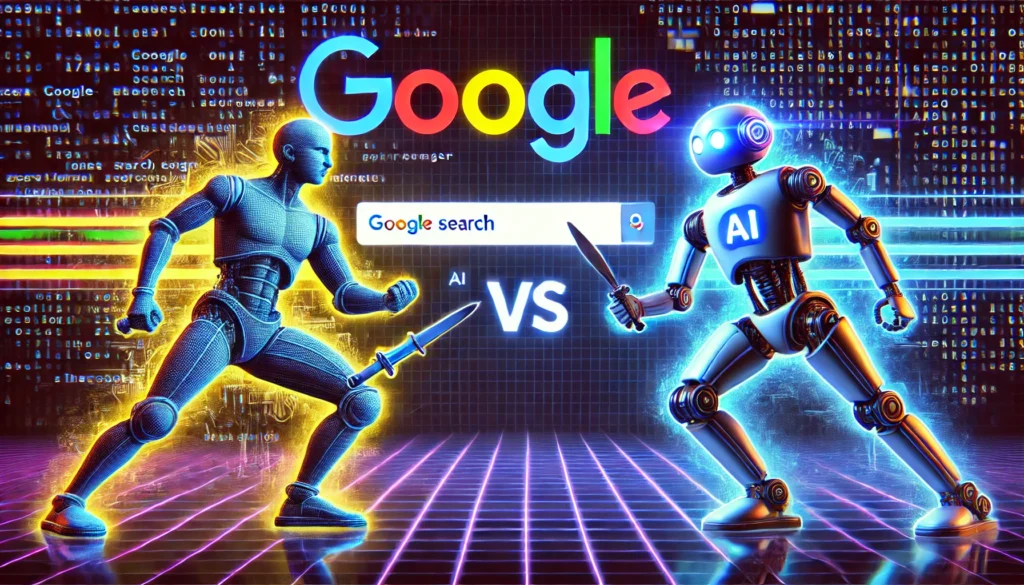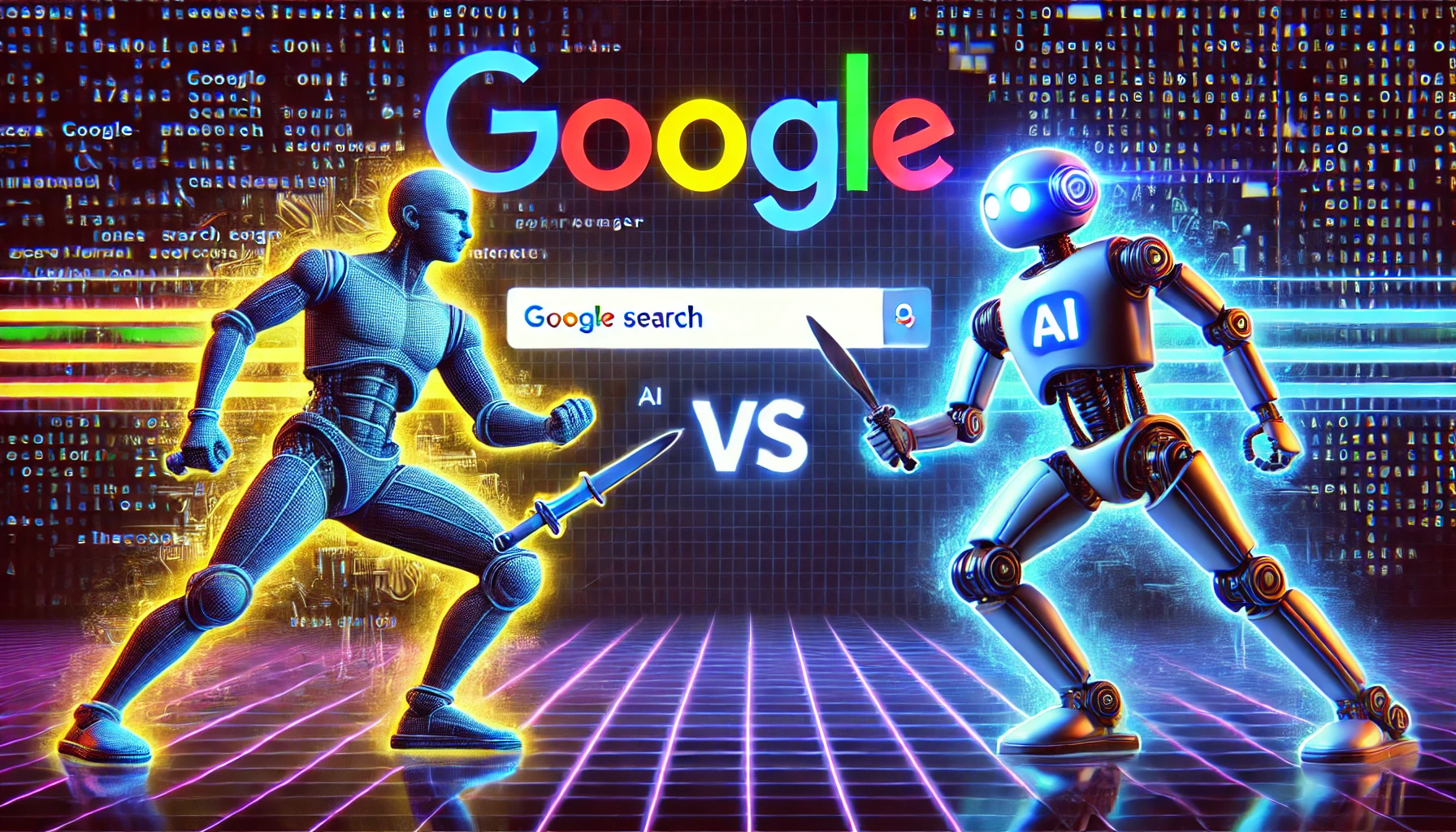Introduction
Is it the end of Google? Well as fancy as this may sound, the truth is out there. Artificial Intelligence (AI) has rapidly evolved, permeating various facets of our daily lives—from virtual assistants like Siri and Alexa to recommendation algorithms on platforms such as Netflix and Amazon. This technological advancement has not only transformed how we interact with digital devices but has also significantly influenced industries, including healthcare, finance, and transportation. One of the most profound impacts of AI is observed in the realm of internet search engines, with Google, the behemoth of online search, standing at a pivotal crossroads.
Google’s dominance in the search engine market is unparalleled, processing over 5 trillion searches annually as of early 2025—a growth rate exceeding 20% over the past two years. This colossal volume underscores Google’s integral role in disseminating information globally. However, the advent of sophisticated AI technologies, particularly generative AI models like OpenAI’s ChatGPT, has introduced new paradigms in information retrieval and content generation. These AI-driven platforms offer users conversational and contextually relevant responses, challenging the traditional keyword-based search model that Google pioneered.
In response to this burgeoning competition, Google has embarked on an ambitious journey to integrate advanced AI capabilities into its core search functionalities. The introduction of features such as AI Overviews and the experimental “AI Mode” signifies Google’s commitment to evolving with the times. AI Overviews aim to provide users with concise, AI-generated summaries of complex queries, enhancing the efficiency of information retrieval. The AI Mode, currently available to select users, offers a more conversational and interactive search experience, akin to engaging with a knowledgeable assistant.
Contents
The Evolution of AI in Search Engines.
Impact on User Behavior and Information Consumption.
Implications for Digital Advertising and SEO..
The Competitive Landscape: AI-Driven Alternatives to Google.
The Future of Google’s Business Model
Top 10 Exclusive Facts About AI’s Impact on Google.
Top 15 FAQs About AI’s Impact on Google’s Future.
These developments raise pivotal questions about the future of Google’s supremacy in the search engine domain. Is the integration of AI a strategic move to maintain its leadership, or does it signal an inevitable transformation that could disrupt Google’s traditional business model? The implications are vast, affecting not only how users access information but also how businesses optimize their online presence and how digital advertising—a cornerstone of Google’s revenue—evolves in this new landscape.
Understanding the impact and importance of AI’s integration into search engines necessitates a comprehensive exploration of its effects on user behavior, information dissemination, and the broader digital economy. As we delve deeper into this subject, we will uncover exclusive insights that shed light on the intricate dynamics between AI advancements and Google’s strategic initiatives, providing a nuanced perspective on whether we are witnessing the end of Google as we know it or the dawn of a new era in intelligent search.
The Evolution of AI in Search Engines
The integration of Artificial Intelligence into search engines represents a significant milestone in the evolution of information retrieval systems. Traditional search engines, including Google, primarily relied on keyword-based algorithms to index and retrieve relevant web pages. While effective, this approach often required users to sift through numerous links to find precise information.
The advent of AI, particularly machine learning and natural language processing, has transformed this landscape. AI enables search engines to understand context, semantics, and user intent more accurately, leading to more personalized and relevant search results. For instance, AI can discern whether a user searching for “jaguar” is interested in the animal, the car brand, or the sports team, thereby delivering tailored results.

Google’s implementation of AI Overviews is a testament to this evolution. These AI-generated summaries provide concise answers to user queries directly on the search results page, reducing the need for users to navigate through multiple links. This feature enhances user experience by delivering information more efficiently, aligning with the growing demand for quick and accurate answers in our fast-paced digital world.
Impact on User Behavior and Information Consumption
The integration of AI into search engines has profound implications for user behavior and information consumption. With AI-generated summaries and conversational interfaces, users can obtain information more quickly and with less effort. This shift caters to the modern user’s preference for immediacy and convenience, potentially reducing the time spent on individual websites.
However, this convenience comes with challenges. The reliance on AI-generated content raises concerns about the accuracy and bias of the information presented. Instances where AI has provided incorrect or misleading information highlight the need for critical evaluation of AI outputs. Moreover, the reduction in direct website visits could impact the diversity of information sources, as users may become more dependent on the AI’s interpretation of data rather than exploring multiple perspectives.
Implications for Digital Advertising and SEO
The shift towards AI-driven search results has significant ramifications for digital advertising and Search Engine Optimization (SEO). Traditionally, businesses optimized their websites to rank higher in search results, driving organic traffic and ad revenue. With AI-generated summaries providing direct answers, the click-through rates to individual websites may decline, challenging the effectiveness of traditional SEO strategies.
This evolution necessitates a rethinking of digital marketing approaches. Businesses may need to focus more on providing unique, high-quality content that AI algorithms deem valuable enough to feature in summaries. Additionally, the nature of digital advertising may shift towards integration within AI-generated content, requiring new formats and strategies to maintain visibility in this transformed landscape.
The Competitive Landscape: AI-Driven Alternatives to Google
The rise of AI-driven platforms like OpenAI’s ChatGPT presents formidable competition to Google’s traditional search model. These platforms offer conversational and contextually aware interactions, allowing users to obtain information in a more natural and engaging manner. This shift challenges Google’s dominance, prompting the company to innovate and integrate similar AI capabilities to retain its user base.
Moreover, the entry of AI-centric startups into the search engine market introduces diverse alternatives for users. These platforms often prioritize user privacy and offer ad-free experiences, appealing to a segment of users dissatisfied with traditional search engines. This diversification of options could lead to a more fragmented search market, compelling established players like Google to adapt to changing user preferences and technological advancements.
The Future of Google’s Business Model
Google’s business model heavily relies on advertising revenue, driven by user engagement with search results. The integration of AI-generated answers could disrupt this revenue stream, as fewer users may click on advertisements if their queries are resolved directly on the search page. To counter this, Google may need to innovate new monetization strategies, such as embedding sponsored content within AI-generated responses or leveraging subscription-based models.
Additionally, Google’s expansion into AI-powered services beyond search, such as enterprise AI solutions and AI-enhanced productivity tools, could provide alternative revenue streams. By diversifying its offerings, Google can mitigate the potential decline in ad revenue and establish itself as a leader in the AI-driven digital economy.
Top 10 Exclusive Facts About AI’s Impact on Google
- AI Overviews Reduce Search Time – AI-generated summaries decrease the average time users spend searching for answers.
- Decline in Organic Website Traffic – Websites that rely on Google searches for visitors may experience a drop in traffic.
- Google’s AI Mode in Beta Testing – A new conversational AI-driven search mode is being tested with select users.
- Increased Accuracy Concerns – AI-generated answers sometimes provide incorrect or biased information.
- SEO Strategies Are Changing – Businesses must adapt to ensure their content is prioritized in AI-generated summaries.
- Privacy-Focused Search Engines Are Rising – AI-driven alternatives are emerging, focusing on user privacy and ad-free experiences.
- Google’s Advertising Model Is Under Threat – Reduced ad clicks could impact Google’s primary revenue source.
- AI Search Assistants Are Gaining Popularity – Users are shifting towards voice and AI-based search assistants for information retrieval.
- Google Is Investing Heavily in AI Research – Billions are being allocated to ensure Google remains at the forefront of AI innovation.
- AI Is Reshaping How We Consume Information – Users are relying more on AI-generated content rather than visiting multiple websites.

Top 15 FAQs About AI’s Impact on Google’s Future
- What is Google’s AI Overview?
- Google’s AI Overview is an AI-generated summary feature integrated into search results, providing concise answers directly on the search page to enhance user experience.
- How does AI Overview affect traditional SEO strategies?
- AI Overviews can reduce click-through rates to individual websites, prompting businesses to adapt their SEO strategies to ensure content is featured within these summaries.
- Will AI-generated content be penalized by Google?
- No, Google does not penalize AI-generated content by default; it prioritizes high-quality, helpful content created with human users in mind.
- How can businesses optimize for AI-driven search results?
- Businesses should focus on creating relevant, high-quality content that aligns with user intent, as AI algorithms prioritize such content in summaries.
- What is Google’s AI Mode?
- AI Mode is an experimental feature offering a conversational, chatbot-like search experience, providing AI-generated answers based on Google’s search index.
- How does AI integration impact Google’s advertising revenue?
- AI-generated answers may reduce the number of clicks on advertisements, potentially affecting Google’s primary revenue stream.
- Are AI-driven search engines a threat to Google’s dominance?
- AI-centric platforms like ChatGPT present competition by offering conversational and contextually aware interactions, challenging Google’s traditional search model.
- How accurate are AI-generated search responses?
- While AI aims for accuracy, there have been instances of incorrect or biased information, highlighting the need for critical evaluation of AI outputs.
- What are the privacy implications of AI in search engines?
- AI-driven alternatives focusing on user privacy and ad-free experiences are emerging, appealing to users concerned about data privacy.
- How does AI affect user behavior in information consumption?
- AI-generated summaries provide quick answers, reducing the need to visit multiple websites, which can impact the diversity of information sources.
- What is the impact of AI on website traffic?
- Websites not featured in AI Overviews may experience a decline in organic traffic, while those included can benefit from increased visibility.
- How can content creators adapt to AI-driven search?
- Content creators should focus on producing high-quality, relevant content that addresses user intent to remain visible in AI-generated search results.
- Will AI replace traditional search engines?
- While AI introduces new paradigms in information retrieval, traditional search engines are adapting by integrating AI to enhance their functionalities.
- How does AI impact digital marketing strategies?
- Marketers need to adjust strategies to account for AI-generated content in search results, focusing on content quality and user engagement metrics.
- What is the future of SEO in an AI-driven search landscape?
- SEO will evolve to prioritize content that aligns with AI algorithms’ preferences, emphasizing user intent and high-quality information.
Conclusion
Its hard to predict if its the end of Google’s search engine. The war has just begun. While AI presents a transformative challenge to Google’s traditional search engine model, it also offers an opportunity for evolution. Whether Google thrives or falters in this new AI-driven era depends on its ability to adapt, innovate, and redefine its business model. The coming years will determine if we are witnessing the end of Google as we know it or the beginning of a new chapter in intelligent search technology.
The integration of Artificial Intelligence (AI) into Google’s search engine signifies a pivotal transformation in the digital information landscape. This evolution is not merely a technological upgrade but a fundamental shift in how users interact with information and how businesses position themselves online.
The Paradigm Shift in Information Retrieval
Traditionally, Google’s search engine operated on algorithms that matched user queries with relevant web pages based on keywords and backlinks. This model, while effective, often required users to sift through multiple links to find precise information. The advent of AI, particularly through features like AI Overviews and AI Mode, has streamlined this process by providing direct, concise answers within the search results page. This shift caters to the modern user’s demand for immediacy and efficiency, reducing the reliance on navigating through numerous web pages.

Implications for Businesses and Digital Marketing
For businesses, this transformation necessitates a reevaluation of digital marketing and SEO strategies. The prominence of AI-generated summaries means that traditional methods of achieving visibility—such as optimizing for specific keywords to rank higher on search engine results pages—may no longer suffice. Instead, the focus must shift towards creating high-quality, relevant content that aligns with user intent and satisfies the criteria set by AI algorithms. This includes understanding the nuances of AI content preferences and ensuring that information is both accurate and engaging.
Moreover, the potential reduction in organic website traffic due to users obtaining answers directly from AI summaries poses challenges for businesses that rely heavily on web traffic for revenue, such as those dependent on ad impressions or affiliate marketing. To mitigate this, businesses might explore alternative engagement strategies, such as enhancing user experience on their platforms, diversifying content distribution channels, and investing in brand loyalty programs.
The Role of AI-Driven Competitors
The rise of AI-centric platforms like OpenAI’s ChatGPT introduces additional dynamics to the search engine market. These platforms offer conversational and contextually aware interactions, providing users with an alternative to traditional search methods. While Google’s integration of AI aims to retain its user base by enhancing search functionalities, the competition underscores the need for continuous innovation and adaptability.
User Experience and Information Accuracy
From a user perspective, the integration of AI into search engines enhances the convenience and speed of information retrieval. However, it also places a greater responsibility on users to critically assess the accuracy of AI-generated content. Instances of AI providing incorrect or biased information highlight the importance of cross-referencing information and maintaining a discerning approach to consuming digital content.
The Future Trajectory of Google’s Search Engine
As AI continues to evolve, its integration into search engines like Google is likely to become more sophisticated, offering even more personalized and contextually relevant results. This progression will further blur the lines between traditional search methods and AI-driven interactions, leading to a more seamless and intuitive user experience.
Related Articles





